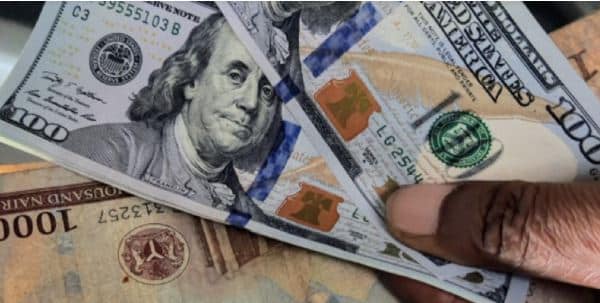News
Naira To Dollar Exchange Rate Closes Week At N1,469.97/$1 At Official Market

Naira to Dollar Exchange Rate closed the week at N1,469.97/$1 at official market.
The Publisher Nigeria reports that the Naira strengthened against the dollar in the official market, to close the week at N1,469.97/$1 as the ongoing demand pressure continued to erode the value of Nigeria’s currency.
This is notwithstanding the Central Bank of Nigeria’s (CBN) implementation of several policies designed to enhance the supply of foreign exchange (forex).
The domestic currency appreciated marginally at the end of the week by 0.71% to close at N1,469.97 to a dollar at the close of business, data from the NAFEM where forex is officially traded, showed.
This represents an N9.5 gain or a 0.71% increase in the local currency compared to the N1,479.47 closed on Thursday.
The intraday high recorded was N1560/$1, while the intraday low was N996/$1, representing a wide spread of N564/$1.
According to data obtained from the official NAFEM window, forex turnover at the close of the trading was $253.77 million, representing a 21% decrease compared to the previous day.
Similarly, the naira appreciated marginally at the parallel forex market where forex is sold unofficially, the exchange rate quoted at N1,485/$1, an increase of 1.01% against N1,500 it closed the previous day,
The Great British Pound (GBP) remained flat at £1/N1,890 while Naira gained against the Euro by 0.95% to close at N1585/EUR1 against NI600 / EUR1 reported the previous day.
In the cryptocurrency market where forex is sold using stablecoins, N1,485/$1. The market crossed N1,400 on the 25th of January and has remained closer to N1500/$1 since then.
Market analysts attributed the current state of Naira to a consistent uptick in the demand for dollars that has persisted since the beginning of January.
Several key factors have fueled this heightened demand which include among other things, a significant portion of the demand which stems from businesses actively seeking to replenish their inventory or procure raw materials, leading to an increased need for foreign exchange.
Individuals pursuing education abroad have also significantly contributed to the surge in demand for dollars. This trend is likely driven by the necessity of covering tuition fees and other educational expenses.
International students are actively bolstering their foreign currency reserves to meet tuition fees and other financial commitments. Additionally, students are securing funds for discretionary spending, including holiday allowances.
